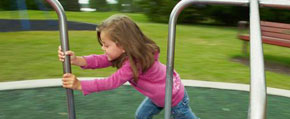We need to increase physical activity among children, in order to create life long healthy habits. Children's participation in regular physical activity is associated with improved cardiovascular and musculoskeletal health, better mental health and emotional wellbeing, as well as prevention of such chronic diseases as obesity, hypertension and type-2 diabetes. There also is substantial evidence showing that children who are physically fit and active tend to perform better in the classroom. Despite the overwhelming evidence that physical activity is beneficial, fewer than half of U.S. children and adolescents currently meet the recommended activity guidelines.
Research indicates that schools are an excellent - though underutilized - place to increase young people's physical activity. This Web Forum will highlight the substantial and growing body of evidence concerning effective ways to get children more active in the school setting - inside as well as outside of regular classes. We'll discuss strategies to improve the quality of physical education, recess, and other school policies, programs, and environments to support physical activity.
Co-sponsored by Active Living Research, a national program of the Robert Wood Johnson Foundation, this Web Forum showcased national leaders summarizing the science behind the role that schools play in supporting physical activity. Hear examples of school policies and school-based interventions designed to get people more active.
Presenters:
- Thom McKenzie, PhD, San Diego State University
- Aaron Beighle, PhD, University of Kentucky
- Martin Gonzalez, California School Boards Association
- Debbie Lou, PhD, Moderator, Active Living Research







